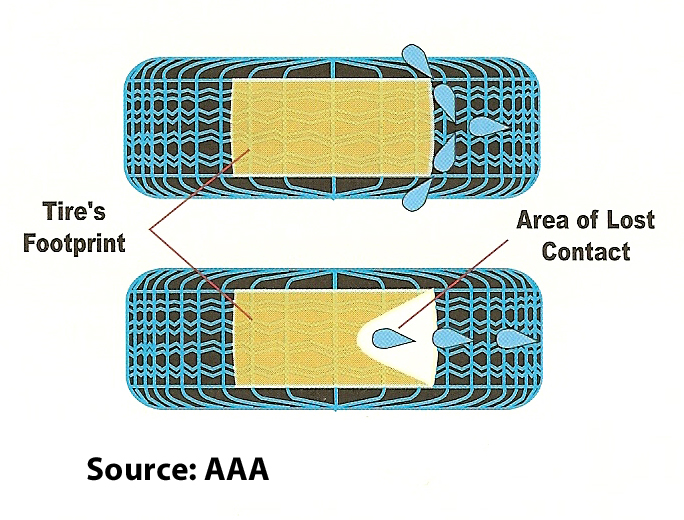7 Tips for Driving on Wet Pavement
June 6, 2014 | Category: Child Injuries | ShareSpring and summer showers may mean flowers, but each year wet pavement and rain contribute to nearly 1.6 million traffic crashes with 7,665 people being killed and over 629,000 being injured because of these weather-related vehicle crashes in the United States.
When the pavement becomes wet, a driver's capabilities and the vehicle's performance may become impaired because of poor visibility, vehicle traction, stability, maneuverability, and pavement friction. Southwest Florida is entering the "rainy season", and knowing how to react in wet weather may make the difference between a safe trip or a trip to the hospital.
AAA (American Automobile Association) in Get A Grip - A Guide to Wet-Weather Driving Techniques reports that wet roads mean poor traction and are most dangerous during the first 10 minutes of a heavy downpour because oil and debris first rise up, then wash away. Poor traction needs to be handled correctly to reduce the potential of hydroplaning, skidding or getting stuck in mud.
"Below are tips from AAA and the Florida Department of Transportation every driver should keep in mind when Florida's rains make our roads slippery," says Collier County Accident Attorney, Randall Spivey of Spivey Law Firm, Personal Injury Attorneys, P.A.
Tip 1 - Preventive checks and maintenance - Before you get caught out in the rain, do some preventative checks and maintenance to your vehicle. All motorists should regularly check their windshield wiper blades, headlights, tail lights, brake lights, turn signals and tires to ensure they are in proper working order.
Tip 2 - Steer clear of collisions - AAA says in rainy weather steering around an obstacle is preferred to braking at speeds above 25 mpg because less distance is required to steer around objects than breaking to a stop. Sudden braking in wet weather often leads to skids. Always look and steer where you want to go.
 Tip 3 - Recognize a water hazard - The vehicle's grip on the road depends upon the small area of contact where the tire meets the road surface. This is called the tire's footprint. The amount of water on the road, speed, and condition of the tires affect the footprint traction. Each tire has to displace one gallon of water per second with only 1/12 of an inch of water between the tires and the road. The amount of tire tread and proper inflation allows the water to escape from under the tires.
Tip 3 - Recognize a water hazard - The vehicle's grip on the road depends upon the small area of contact where the tire meets the road surface. This is called the tire's footprint. The amount of water on the road, speed, and condition of the tires affect the footprint traction. Each tire has to displace one gallon of water per second with only 1/12 of an inch of water between the tires and the road. The amount of tire tread and proper inflation allows the water to escape from under the tires.
Tip 4 - Avoid cruise control - The chance of losing control of a vehicle in bad weather increases if the cruise control is used. AAA says that if cruise control is used and the vehicle starts to skid the system may interpret the skid-induced reduction in forward speed as a need to apply more engine power. This makes it harder to recover from a skid.
Tip 5 - Increase following distance and focus - Increased following distance allows more time to stop. AAA also recommends that drivers focus as far ahead as possible - at least 20 to 30 seconds. By focusing ahead drivers can begin to slow down for intersections, turns, and other traffic early.
Tip 6 - Turn headlights on - Florida law requires motorists to turn on their vehicle headlights when there is insufficient visibility due to weather conditions. However, it is illegal to drive with flashing hazard lights on. Flashing hazard lights are only to be used when vehicles are parked off the road.
Tip 7 - Pump wet brakes - Wet brakes may pull to one side or may lose their ability to brake at all. Should brakes become wet, it is advisable to pump them lightly after driving through water.
Collier County Accident Attorney, Randall L. Spivey is a Board Certified Trial Attorney – the highest recognition for competence bestowed by the Florida Bar and a distinction earned by just one (1%) percent of Florida attorneys. He has handled over 2,000 personal injury and wrongful death cases throughout Florida. For a free and confidential consultation to discuss your legal rights, contact the Spivey Law Firm, Personal Injury Attorneys, P.A., in Lee County at 239.337.7483 or toll free at 1.888.477.4839,or by email to Randall@SpiveyLaw.com. Visit SpiveyLaw.com for more information. You can contact Spivey Law Firm, Personal Injury Attorneys, P.A.in Charlotte County at 941.764.7748 and in Collier County 239.793.7748.

